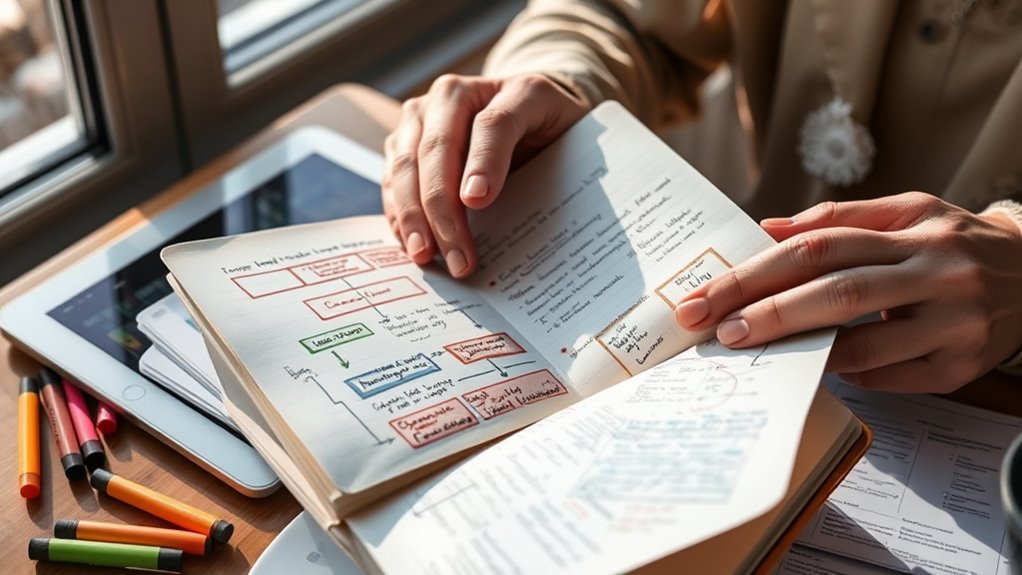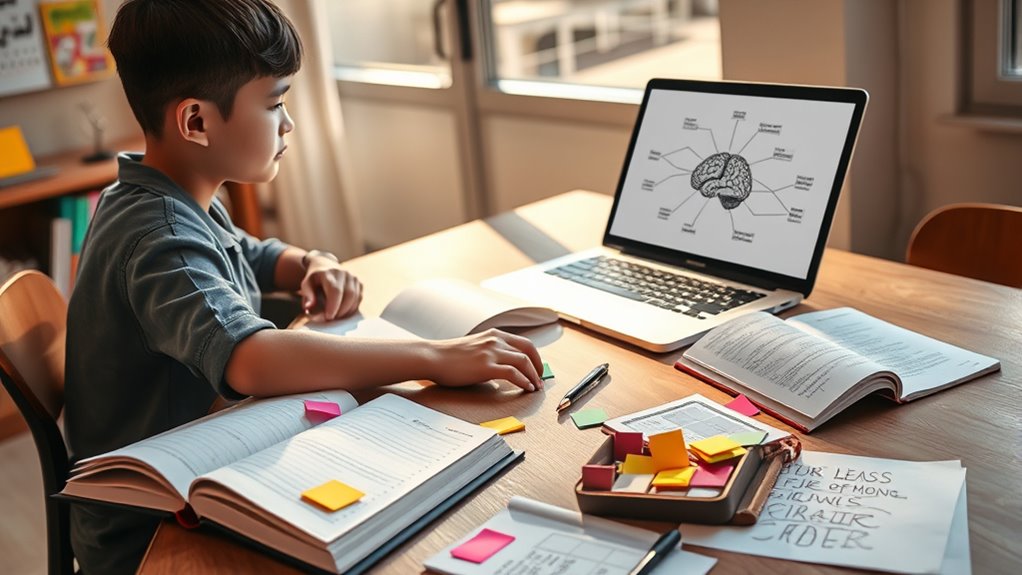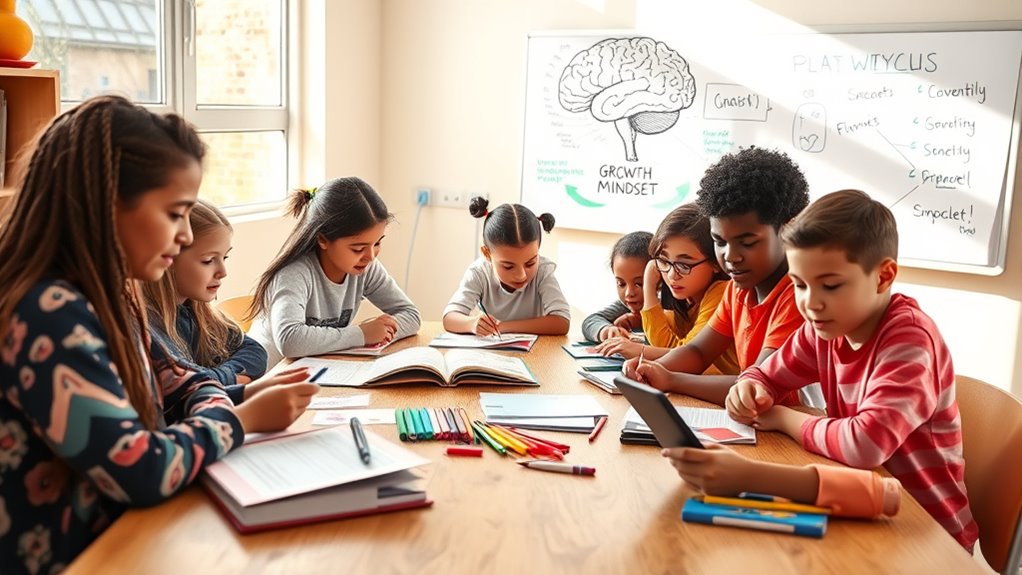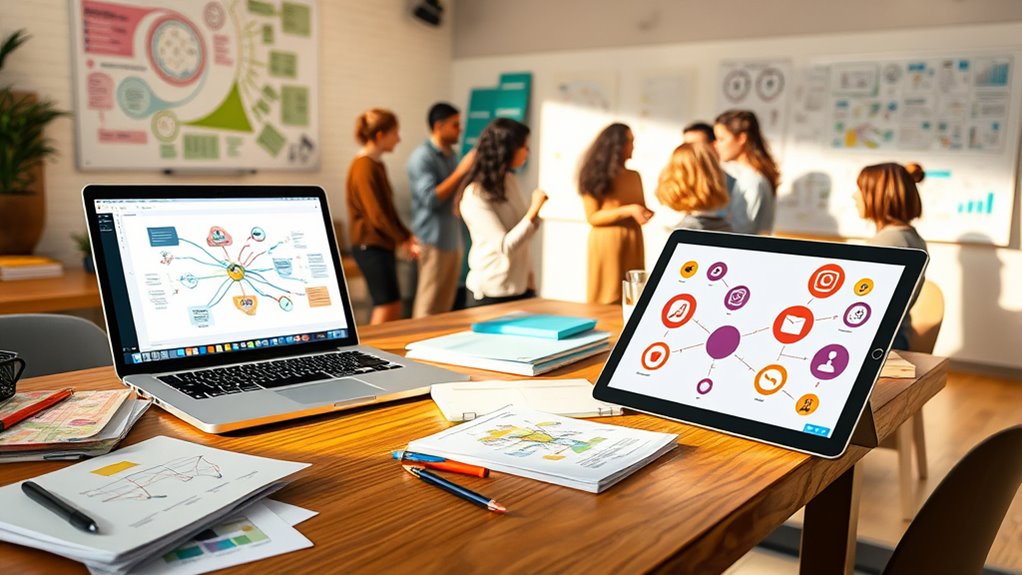To learn how to learn across any field, focus on developing meta-skills like cognitive flexibility, emotional resilience, and a growth mindset. Cultivate curiosity, challenge assumptions, and practice critical thinking to solve problems effectively. Use memory tricks like mnemonics and active recall to boost retention. Break tasks into manageable steps and stay persistent despite setbacks. Keep exploring these strategies, and you’ll discover how to adapt and excel in any discipline you pursue.
Key Takeaways
- Developing meta-skills like cognitive flexibility and emotional resilience enables effective adaptation and mastery across diverse fields.
- Building a growth mindset and embracing challenges foster resilience and openness to continuous learning.
- Utilizing memory techniques such as mnemonics and spaced repetition improves retention and practical application of knowledge.
- Critical thinking, bias recognition, and information evaluation are essential for analyzing and solving complex problems.
- Applying technological understanding and reflection across disciplines enhances innovation, decision-making, and interdisciplinary problem-solving.
The Foundation of Meta-Skills in Learning

Understanding the foundation of meta-skills in learning is essential because these skills enable you to adapt, improve, and master new information more effectively. Two core components are cognitive flexibility and emotional resilience. Cognitive flexibility allows you to shift perspectives, embrace new ideas, and adjust your strategies when faced with challenges. Emotional resilience helps you handle setbacks without losing motivation or confidence. Together, these skills form the backbone of effective learning, empowering you to navigate complex problems and unfamiliar topics confidently. Building these meta-skills means developing a mindset that’s open to change and capable of bouncing back from difficulties. By strengthening both, you create a flexible, resilient approach that enhances your ability to learn efficiently across any field.
Developing Critical Thinking for Better Problem-Solving

Building on your foundation of meta-skills like cognitive flexibility and emotional resilience, developing critical thinking sharpens your ability to analyze problems more effectively. You learn to identify logical fallacies that can distort reasoning and weaken arguments. Bias recognition is essential, helping you spot personal or external prejudices that cloud judgment. As you evaluate information, ask questions and challenge assumptions rather than accepting ideas at face value. Critical thinking encourages you to weigh evidence carefully, consider alternative perspectives, and avoid jumping to conclusions. This skill enhances your problem-solving by making your decisions more rational and less influenced by emotion or misinformation. Additionally, understanding the cyber threat landscape enables you to recognize potential external risks that could impact your reasoning or security. Over time, cultivating these abilities leads to clearer, more objective reasoning—empowering you to tackle complex problems with confidence.
Enhancing Memory and Retention Strategies

Since your ability to remember information directly impacts your learning efficiency, adopting effective memory and retention strategies is essential. You can boost recall by using techniques like mnemonic devices, which simplify complex data into memorable cues. Additionally, mind mapping helps organize information visually, revealing connections and reinforcing understanding. To deepen retention, consider these strategies:
- Use mnemonic devices to encode information creatively.
- Create mind maps to visualize relationships and hierarchies.
- Regularly review material to strengthen memory pathways.
- Incorporate memory techniques that leverage the brain’s natural tendencies for better retention.
These methods make learning active and engaging, ensuring you retain knowledge longer. Incorporating mnemonics and mind maps transforms passive studying into a dynamic process, enhancing your ability to recall and apply information effectively.
Cultivating Curiosity and Growth Mindset

Cultivating curiosity and a growth mindset can substantially enhance your learning journey by encouraging you to embrace challenges and see failures as opportunities to improve. Mindset shifts are vital here; they help you view setbacks as part of growth rather than fixed limitations. Curiosity cultivation fuels your desire to explore new ideas, ask questions, and seek deeper understanding. By actively fostering these qualities, you develop resilience and openness to learning. This mindset empowers you to persist through difficulties, recognizing that effort and experimentation lead to mastery. Additionally, understanding shark behavior and safety precautions can help you approach challenging environments with confidence and awareness. Over time, these practices transform your approach to learning, making it more engaging and productive. Embracing curiosity and a growth mindset creates a foundation for continual self-improvement and lifelong learning.
Practical Techniques for Accelerated Learning

To learn faster, you should use techniques like spaced repetition to reinforce memory over time, making retention more durable. Active recall helps you test your understanding actively, rather than passively reviewing material. Focused practice techniques keep your attention sharp and guarantee you’re mastering skills efficiently. Additionally, integrating proper tea brewing techniques can improve focus and mental clarity during study sessions.
Spaced Repetition Strategies
Spaced repetition is a powerful technique that helps your brain retain information more effectively by scheduling review sessions at increasing intervals. This method enhances memory consolidation, making it easier to recall information over the long term. To maximize its benefits, consider these strategies:
- Schedule reviews strategically—initially after a day, then after several days, and later weeks—to reinforce learning.
- Use reminders or apps to automate your review sessions, ensuring consistency and reducing forgetfulness.
- Focus on difficult topics during reviews, as repeated exposure strengthens neural connections.
- Being aware of divorce statistics in your region can help tailor your learning priorities and understand the importance of effective memory techniques.
Active Recall Methods
Have you ever wondered how some people seem to memorize information effortlessly? Active recall methods are key. Instead of passively rereading, test yourself regularly—use flashcards or practice questions. Mnemonic devices can help encode complex data, making recall easier. Visualization techniques also boost memory by creating mental images linked to concepts. For example, picture a vivid scene that represents the material you’re learning. These strategies strengthen neural connections, making retrieval faster and more accurate. When you actively quiz yourself, you identify gaps and reinforce learning. Combining mnemonic devices with visualization transforms abstract information into memorable images. The more you practice active recall, the more confident and efficient your learning becomes. It’s a powerful way to move knowledge from short-term to long-term memory.
Focused Practice Techniques
Focused practice techniques are essential for accelerating your learning process by honing your skills through deliberate and targeted efforts. By cultivating mindful focus, you guarantee your attention stays on specific aspects you want to improve. Deliberate repetition helps reinforce new information and build mastery. To maximize effectiveness:
- Break skills into smaller components, focusing on one at a time.
- Use focused sessions with minimal distractions to deepen mindful focus.
- Regularly review and repeat challenging tasks through deliberate repetition to solidify learning.
- Incorporate metacognitive strategies to reflect on your progress and adjust your practice accordingly.
These techniques keep your mind engaged and prevent passive learning. Consistent, mindful focus during practice sharpens your skills faster and makes learning more efficient. Applying focused practice techniques transforms effort into measurable progress, helping you master new concepts more effectively.
Overcoming Common Learning Obstacles

Many learners encounter obstacles that hinder their progress, but recognizing and addressing these challenges is essential for improvement. Common issues include motivational barriers and rigid mindset shifts. When motivation drops, remind yourself of your goals and focus on small wins to regain momentum. Rigid mindset shifts, like believing you’re “not good enough” or “can’t learn this,” limit growth. Instead, adopt a growth mindset—see failures as opportunities to improve. Break tasks into manageable steps to avoid feeling overwhelmed. Staying patient and persistent, and celebrating progress along the way, are crucial. Additionally, understanding the importance of contrast ratio helps you appreciate how image quality impacts your viewing experience and motivates you to optimize your setup. By actively shifting your mindset and tackling motivational barriers head-on, you create a more resilient learning process. Overcoming these obstacles empowers you to stay committed and ultimately master new skills more effectively.
Applying Meta-Skills Across Different Fields

Applying meta-skills across different fields requires you to adapt core abilities like critical thinking, problem-solving, and self-regulation to new contexts. This flexibility fosters interdisciplinary innovation and enhances your adaptive expertise, enabling you to transfer skills seamlessly. To succeed, consider these strategies:
- Recognize patterns that transcend disciplines to make connections and foster creative solutions.
- Cultivate curiosity to explore unfamiliar territory confidently, broadening your knowledge base.
- Practice reflection to refine your approaches, ensuring adaptability in varied environments.
- Understanding electric bike capabilities can help you better evaluate technological solutions across various fields.
Frequently Asked Questions
How Can I Measure My Progress in Developing Meta-Skills Effectively?
To measure your progress in developing meta-skills, you should regularly track benchmarks and conduct skill assessments. Set clear, specific goals and review them periodically to see improvements. Keep a journal of your learning experiences, noting challenges and successes. This active tracking helps you identify growth areas. By consistently evaluating your skills, you’ll gain insight into your development, stay motivated, and adjust your strategies for continuous improvement.
What Role Does Emotional Intelligence Play in Accelerated Learning?
Imagine your mind as a garden where emotional intelligence acts as the nourishing sun. When you master emotional regulation, you clear weeds of frustration and distraction, letting focus flourish. Empathy helps you connect deeply, revealing new insights and motivation. Together, they accelerate learning by fostering resilience and openness. Cultivating these skills transforms your learning journey into a vibrant, unstoppable growth process, turning challenges into opportunities for mastery.
Can Meta-Skills Be Tailored to Specific Career or Personal Goals?
Meta-skills can definitely be tailored to your specific career or personal goals. By developing personalized strategies, you focus on goal-oriented skills that directly support your objectives. You identify which meta-skills—like critical thinking or adaptability—are most relevant, then refine them through targeted practice. This customization helps you accelerate learning, stay motivated, and achieve your goals more efficiently, making your growth both effective and aligned with your unique aspirations.
How Do Cultural Differences Influence Learning Strategies and Meta-Skills?
You should recognize that cultural differences considerably influence learning strategies and meta-skills. Cultural adaptation shapes how you approach learning, affecting your preferences and methods. Embracing learning diversity allows you to tailor your meta-skills to fit different cultural contexts, enhancing effectiveness. By being aware of these differences, you can develop flexible strategies that respect diverse perspectives, ultimately improving your ability to learn across various environments and achieve your personal or career goals more successfully.
What Are the Signs That I Need to Adjust My Learning Approach?
You notice when your motivation shifts, your focus wanes, and your progress stalls. These signs tell you it’s time to adjust your learning approach. When attention lapses become frequent, and energy dips, it indicates your current methods no longer serve you. You need to vary your techniques, set new goals, or take breaks. Recognizing these signs helps you stay engaged, adapt effectively, and keep moving forward in your learning journey.
Conclusion
Think of learning as a journey through a vast, open landscape—you’re the explorer shaping your path. By developing meta-skills, you’ll navigate challenges with confidence and curiosity, turning obstacles into opportunities. These skills are your compass, guiding you through any field with ease. Embrace the process, stay curious, and remember, learning is like a muscle—you get stronger the more you use it. Keep exploring and enjoy every step of your growth.










